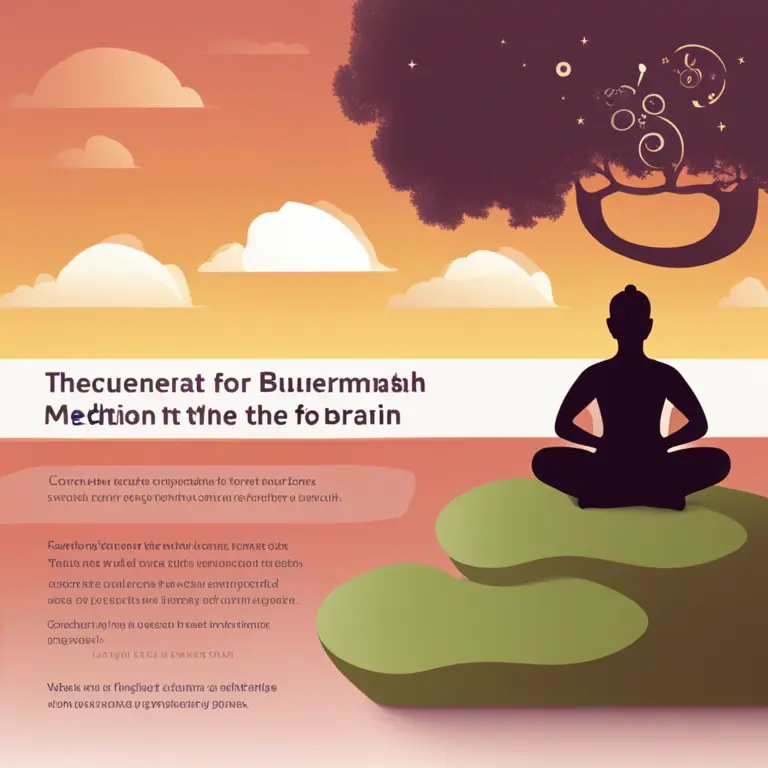
Optimal Meditation Techniques for Enhanced Brain Function
Discover the best meditation practices to boost your brain power and improve mental clarity, focus, and wellbeing in this insightful article.
article by Hina Kurosawa
The Significance of Meditation for the Brain
Meditation has been revered for centuries for its expansive range of health benefits, particularly for the brain. In recent times, scientific research has provided empirical evidence supporting these claims. Regular meditation has been found to enhance neuroplasticity, the brain's ability to form new neural connections, increase gray matter density, sharpen focus, and alleviate stress. Furthermore, it can slow down the brain's aging process, potentially staving off cognitive decline and bolstering overall mental health. This article delves into the most effective meditation techniques that are specifically designed to harness these benefits for your cognitive wellbeing.

1. Mindfulness Meditation: Cultivating Present-Moment Awareness
Mindfulness meditation is a practice that encourages acute awareness of the present moment. By concentrating on your breath or bodily sensations, mindfulness meditation helps to train the brain to remain focused on the current task, reducing the tendency to get distracted by intrusive thoughts. Studies have shown that mindfulness can significantly improve attention span, working memory, and executive function. This makes it an ideal practice for those seeking to enhance their cognitive faculties and achieve a state of tranquility amidst their hectic daily lives.

2. Focused Attention Meditation: Honing Concentration
Focused attention meditation involves zeroing in on a single object, sound, or thought, excluding all other stimuli to enhance concentration. This form of meditation is excellent for exercising the brain's attention muscles. By repeatedly directing your focus to your chosen point of concentration and gently guiding it back when it wanders, you are training the brain to stay on task, potentially increasing your attention span and reducing susceptibility to distractions.

3. Transcendental Meditation: Accessing Deep Rest
Transcendental Meditation (TM) is a technique that employs a personalized mantra to help the individual transcend to a state of deep relaxation and restful alertness. Numerous scientific studies have associated TM with reduced stress, anxiety, and depression, alongside improved brain function and clarity of thought. TM differs from other forms of meditation in its unique approach to transcending thought, which can lead to profound cognitive and physiological changes.

4. Loving-Kindness Meditation: Boosting Emotional Intelligence
Loving-kindness meditation, or Metta meditation, focuses on cultivating feelings of compassion and love for oneself and others. By visualizing sending and receiving kindness, neurons associated with empathy and emotional processing are stimulated, which can, in turn, enhance social connectedness and emotional health. A brain infused with positive emotions works more efficiently, leading to better decision-making and problem-solving abilities.
5. Body Scan Meditation: Improving Somatic Awareness
A body scan meditation invites you to focus on different parts of your body one by one. This practice enhances somatic awareness and fosters a mind-body connection, relieving physical stress that often coexists with mental tension. Research indicates that body scans not only help in reducing anxiety but also improve the brain's ability to integrate internal and external information, leading to better overall cognitive function.
Published: 1/14/2024
Modified: 1/15/2024
More predictions
Come back here soon to learn more about yourself and your future


Calming the Storm: Mindfulness Meditation for Anger
Discover how mindfulness meditation can be a powerful tool for anger management, promoting inner peace and emotional balance.


Mindfulness & Meditation: A Guide for High Schoolers
Discover the benefits of mindfulness meditation tailored for the hectic life of high school students, and learn simple strategies to incorporate it into the daily routine.


Harmonizing Life with Meditation Mantras
Delve into the transformative power of meditation mantras to align mind, body, and spirit for a harmonious existence.